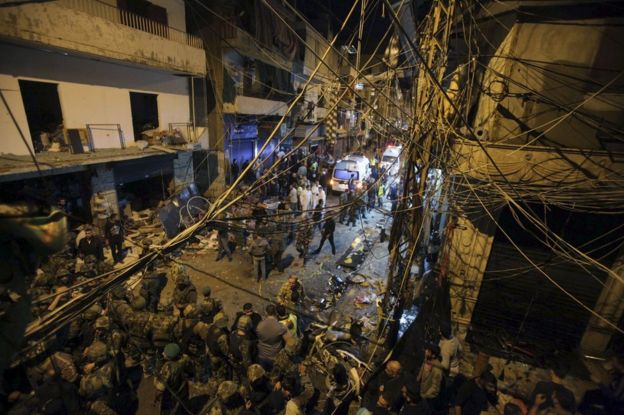
BEIRUT — Twin suicide bombings claimed by the Islamic State killed dozens of people and wounded more than 200 in Beirut on Thursday, raising fears of intensified attempts by the radical Sunni group to undermine Lebanon’s fragile stability.
In the worst attack to hit the Lebanese capital in years, assailants targeted a southern suburb where many loyalists of the powerful Shiite Hezbollah militia live. The explosions killed at least 43 people, officials said, and left little doubt that the attackers struck with the intent of stirring up Lebanon’s volatile sectarian divisions.
Hezbollah is fighting alongside Syrian government forces against the Sunni-led rebellion in Syria, drawing the ire of such militantly anti-Shiite groups as the Islamic State. Lebanon faced a string of similar bombings more than a year ago that also targeted the largely Shiite areas of Beirut.
In a statement translated by the SITE Intelligence Group, the Islamic State said the first bomber struck with an explosives-rigged motorcycle, followed by a second assailant wearing a suicide vest.
The statement, published on Twitter and other social-network platforms, said the group targeted the Hezbollah “stronghold,” killing more than 40 people and wounding over 200. The statement’s authenticity could not be independently verified.
 Lebanese security personnel and civilians gathernear the site of a twin suicide blasts in southern Beirut on Nov. 12, 2015. (Bilal Hussein/AP)
Lebanese security personnel and civilians gathernear the site of a twin suicide blasts in southern Beirut on Nov. 12, 2015. (Bilal Hussein/AP)Lebanese Health Minister Wael Abu Faour said a third suicide bomber was killed when the second attacker detonated his explosives, preventing that third person from detonating his payload in the Burj al Barajinah neighborhood of Beirut. The two other bombers struck close together in the notoriously congested area of the city during rush hour, apparently to maximize the number of victims, who included children, Lebanese officials said.
At the scene of the attack, mangled bodies lay in pools of blood and broken glass as people shouted for help and tried to find missing loved ones. Security personnel who had rushed to the scene appeared stunned by the carnage. Ambulances could be heard speeding to and from the scene late into the night, while hospitals and aid groups issued public requests for blood donations.
Prime Minister Tammam Salam called for a national day of mourning and an end to the sectarian-driven squabbles that have crippled Lebanon’s government to the point of even hampering trash collection in Beirut.
“I pray that this tragedy is enough to wake up politicians so that they can put their differences aside so we can protect the country,” Salam said in a statement.
Such attacks in the past have been carried out by Sunni extremists angered by Hezbollah’s entry into the Syrian civil war. The Lebanese militia is backed by Shiite Iran, which also is an ardent supporter of Syrian President Bashar al-Assad’s government against the Sunni-led rebellion.
The bombings in Lebanon had stopped about a year and a half ago after a Hezbollah offensive along the Syria-Lebanon border subdued the militants who had been directing attacks in the capital. Those militants were linked to such extremist groups as Jabhat al-Nusra, Syria’s al-Qaeda affiliate, and the Islamic State.
The lull in bombings also resulted from greater cooperation between Hezbollah and Lebanon’s Sunni politicians. That coordination became more urgent as the Islamic State made rapid territorial gains in Iraq and Syria and appeared to threaten Lebanon’s tenuous stability.
Over the past year, much of Beirut’s Shiite-dominated southern suburbs have been put on lockdown, with checkpoints and patrols by the military and Hezbollah fighters closely scrutinizing all that comes into the area.
Thursday’s attack is a blow to Hezbollah’s security in the capital, and it comes as Lebanon increasingly struggles with the multifaceted fallout from the devastating civil war in neighboring Syria.
Lebanon’s diverse religious groups maintain tense relations with each other that can easily explode into violence. Factions in the country fought a devastating 15-year civil war, which ended in 1990.
World powers are scheduled to meet in Vienna this weekend to discuss ways of ending the Syrian conflict, which has killed more than 250,000 people and displaced millions. The gathering is backed by Washington and Moscow, which support opposing sides in the war, and signals rising international urgency to end a conflict that has empowered extremists and aggravated already simmering sectarian tension in the region.
Still, the chances for any sudden diplomatic breakthrough appear to be slim. Differences over what to do with Assad in a post-conflict transition still divide the opposing sides. Militants in the city have fought in Syria with extremist groups. Last year, many returned to Tripoli to stage a small revolt that the military put down.
As many as 1.5 million Syrians have taken refuge in Lebanon, a country of barely 4 million people, straining its economy and the brittle relations among its many religious groups.
Lebanese politicians have failed to come to agreement for the past 17 months over selecting a president. The paralysis resulted in a garbage-collection crisis that left festering mounds of trash in the streets of Beirut and prompted large anti-government protests over the summer.
Rising militancy among disaffected Sunnis in the northern port city of Tripoli has proved especially difficult for authorities.



